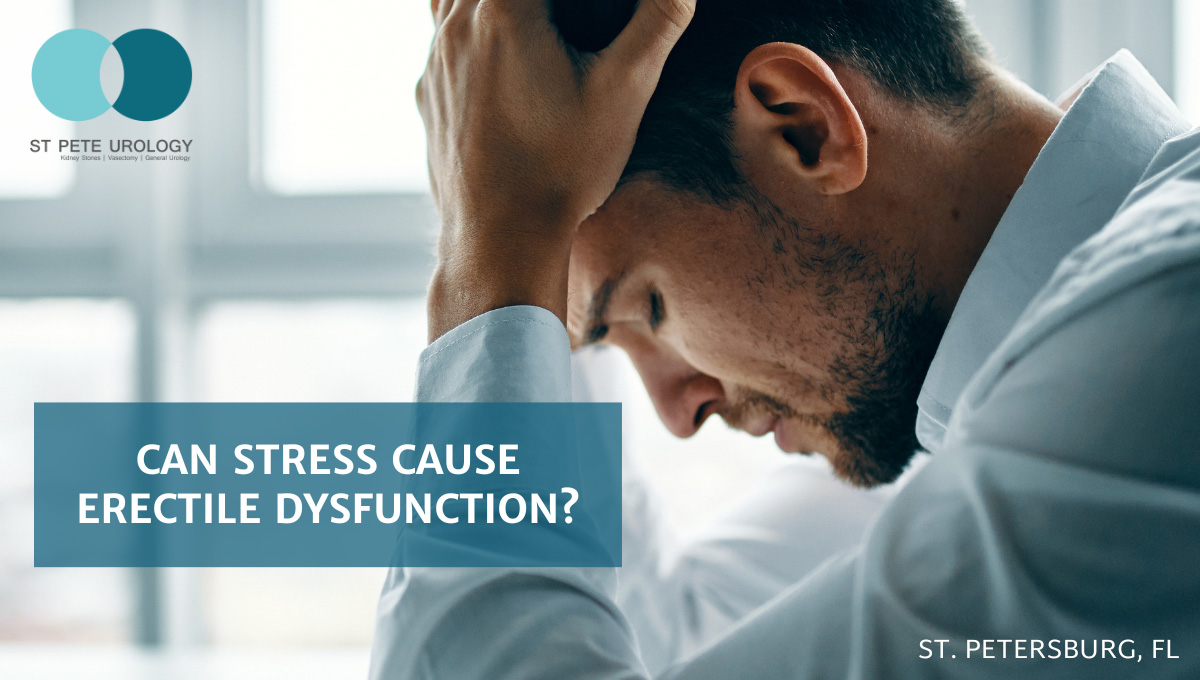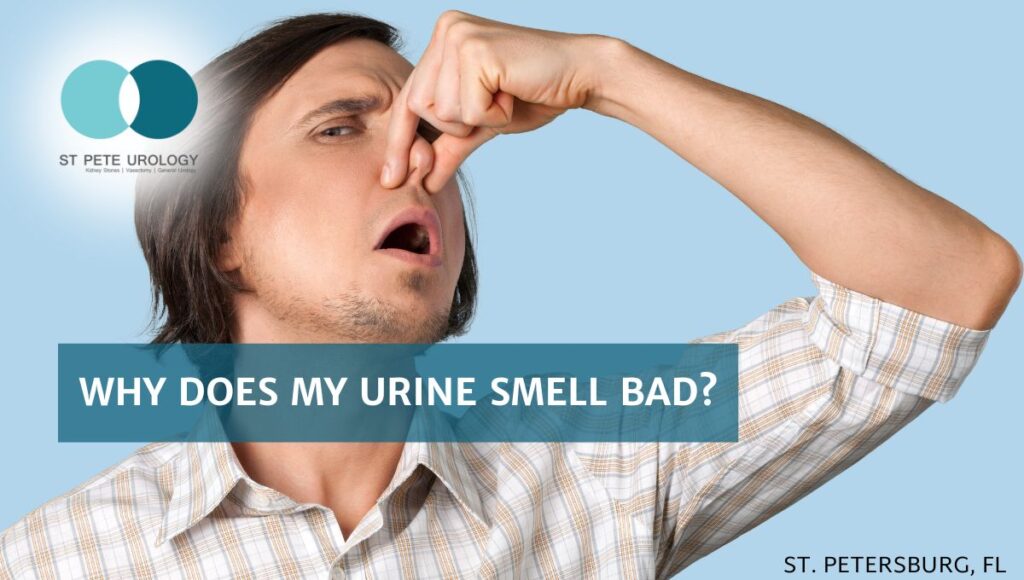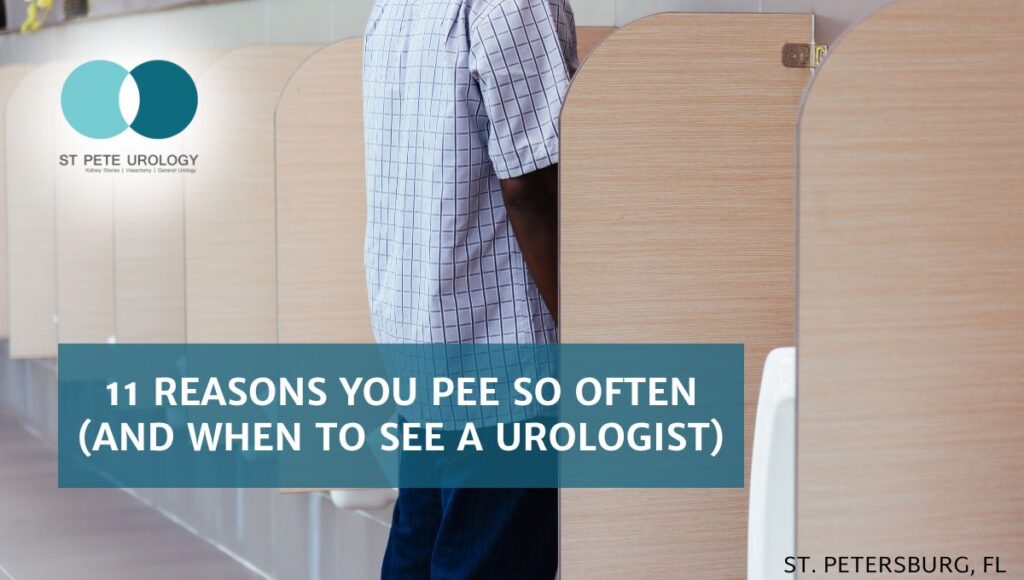3 Key Takeaways:
- Stress can cause erectile dysfunction (ED) by disrupting hormonal balance and hampering blood flow.
- Recognizing stress and seeking professional help while making healthy lifestyle changes can help improve ED.
- Specialized urologists can help diagnose and address the root causes of ED.
 Stress, an inescapable aspect of modern living, has profound implications on our health. It’s not just a mental burden but also a physical one, with impacts ranging from disturbed sleep to an increased risk of heart disease. Among its various effects, stress significantly influences sexual health, particularly erectile dysfunction (ED). To fully grasp the scope of this issue, it’s essential to explore what ED entails and how it intertwines with stress.
Stress, an inescapable aspect of modern living, has profound implications on our health. It’s not just a mental burden but also a physical one, with impacts ranging from disturbed sleep to an increased risk of heart disease. Among its various effects, stress significantly influences sexual health, particularly erectile dysfunction (ED). To fully grasp the scope of this issue, it’s essential to explore what ED entails and how it intertwines with stress.
Understanding Erectile Dysfunction and Its Causes
Erectile dysfunction, a condition affecting millions worldwide, involves the inability to achieve or maintain an erection adequate for satisfactory sexual activity. While commonly thought to be a problem of older age, ED can affect men at any stage of their life. The causes of ED are multifaceted, including physical factors like heart disease, diabetes, obesity, and psychological aspects such as anxiety, depression, and notably, stress.
The Interplay of Stress and Erectile Dysfunction
The human body’s response to stress involves releasing hormones like cortisol and adrenaline. This ‘fight or flight’ reaction, while beneficial in short bursts, can have detrimental effects when prolonged. It can disrupt hormonal balance and impair blood flow, both critical to maintaining erectile function. Chronic stress can lead to persistent hormonal imbalances and a state of anxiety, often culminating in performance anxiety. This fear of sexual failure can, in turn, initiate or exacerbate ED. Numerous studies underscore the significant links between stress and ED, demonstrating how both physiological and psychological stressors can impair the mechanisms critical for healthy erectile function.
Managing Stress to Enhance Erectile Function
Addressing stress-induced ED begins with recognizing and confronting the stressors in one’s life. Seeking professional guidance, either from a psychologist or a urologist, can provide strategies for managing stress and its effects on sexual health. Incorporating stress-reduction techniques like regular exercise, meditation, and ensuring sufficient sleep are vital steps. These practices not only help in alleviating stress but also enhance blood flow, thus supporting erectile function. Additionally, cultivating positive and supportive relationships can be a powerful tool in managing stress and fostering an environment conducive to sexual health.
Broader Treatments and Solutions for Erectile Dysfunction
Beyond stress management, addressing ED can involve various medical treatments. Prescription drugs, injections, and in some cases, surgery, offer effective solutions. Psychological therapies, particularly cognitive-behavioral therapy, play a crucial role in tackling the psychological roots of ED, such as stress and anxiety. Furthermore, adopting healthy lifestyle habits—balanced diet, regular physical activity, and moderation in alcohol consumption—can significantly bolster erectile function.
Conclusion
Stress, in its many forms, has a significant impact on erectile function. Recognizing and effectively managing stress, alongside adopting healthy lifestyle choices, can markedly improve conditions like ED. It’s important to remember that managing stress is not just about sexual health; it’s about enhancing overall well-being. St Pete Urology in St. Petersburg, FL, provide comprehensive care, focusing on diagnosing and treating the underlying causes of ED, be it stress or other factors. They offer a pathway to not only improved sexual health but also a more balanced, stress-free life.
References:
- “Can Stress and Anxiety Cause Erectile Dysfunction? – Healthline.” 8 Nov. 2016, https://www.healthline.com/health/erectile-dysfunction-anxiety-stress.
- “Erectile Dysfunction and Stress Management – WebMD.” 4 Sep. 2023, https://www.webmd.com/erectile-dysfunction/ed-stress-management.
- “Treatment for Erectile Dysfunction – NIDDK.” https://www.niddk.nih.gov/health-information/urologic-diseases/erectile-dysfunction/treatment.





